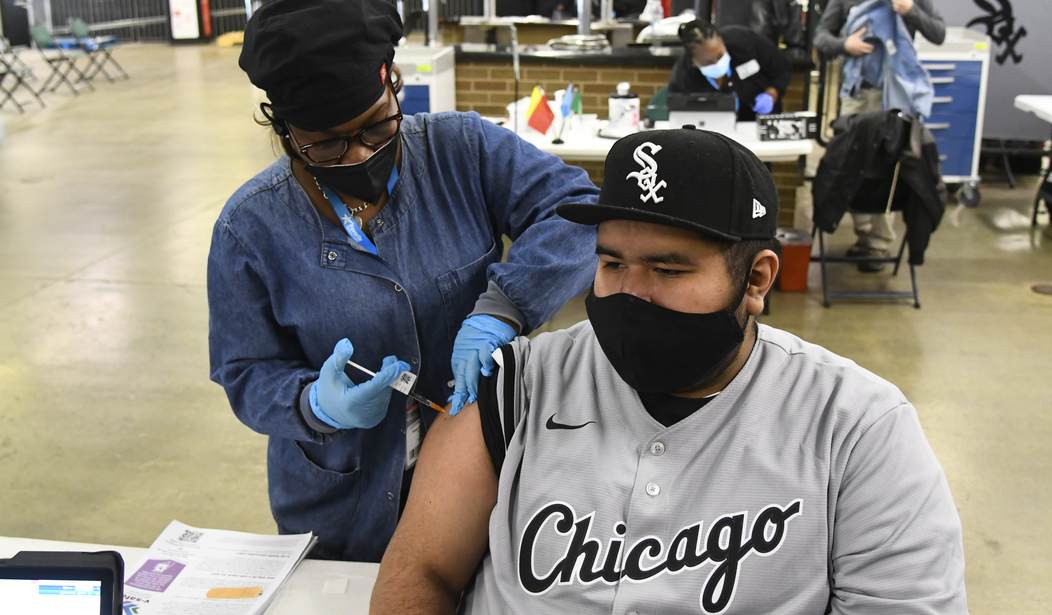I mean, they’re sort of right. It depends on what you think was “promised.”
Last year scientists were hoping we’d end up with a shot that kept people from getting very sick and dying. Well, we got that. But for a few brief glorious months in early 2021, it seemed like the vaccines would end up doing much more. Until Delta arrived, they were preventing transmission as well. Now Delta’s here and they’re no longer foolproof in keeping the vaccinated from being infected.
So what was “promised”? That the vaccines would keep us out of the morgue or that the vaccines would restore full normalcy for everyone who got one?
The reaction to this question is one of several fascinating results in the Kaiser Family Foundation’s new monthly survey of attitudes about COVID:

The alternate option there, that the booster shows scientists are making the vaccines more effective, is an odd one. That would be true if Pfizer had tweaked its formula so that the booster targeted the Delta variant more closely than the original vaccine did, but Pfizer recipients are just getting a third dose of the same old stuff. Scientists haven’t made the vaccine more effective, they’re simply giving us more of it to elicit a new round of antibody production.
Now that I’ve half-heartedly stuck up for the unvaccinated, here’s a result where they embarrass themselves:

One of the most well-known data points of the pandemic is that people needing hospital care for COVID are overwhelmingly unvaccinated. The fact that two-thirds of the unvaccinated population can’t bring themselves to acknowledge that all but proves that there’s nothing can one say to persuade them at this point. Any remaining holdouts who end up getting their shots will either be coerced or scared into doing so.
In fact, another KFF result basically confirms that:

Just five percent of the recently vaccinated say social pressure was the main reason they got immunized, less than the number who said they did so because their employer mandated it. We’ve reached the rump of the anti-vax resistance at this stage of the national effort. They’re not going to be talked into it. That’s the bad news.
The good news is that, despite all of the bluster about holdouts vowing to walk off the job if their boss demands they get their shots, many of them turn out to be bluffing when you call them on it:
With just days or even hours to spare [before New York’s vaccine mandate deadline], thousands of health care workers got inoculated, according to health officials across the state. And while thousands more workers remained unvaccinated, and thus in danger of being suspended or fired, the rush of last-minute vaccinations appeared to blunt the worst-case scenarios for staffing shortages that some institutions had feared.
In the New York City public hospital system, more than 8,000 workers were unvaccinated a week ago. But by Monday morning, that number had dropped to 5,000 — or just over 10 percent of the work force. Although those unvaccinated employees were not permitted to work, city officials said they felt they could manage the gaps…
Statewide, the vaccination rate for hospital employees rose by Monday night to 92 percent of workers receiving at least one dose, according to preliminary data from the governor’s office. The rate for nursing homes also jumped to 92 percent on Monday from 84 percent five days earlier. Still, many nursing homes were already facing serious staffing shortages before the mandate, making any new staff reductions potentially dangerous.
Yesterday the union for Massachusetts state police officers reported that dozens were preparing to resign in protest of the new vaccination mandate. As of today, exactly one had tendered his resignation. In fact, KFF’s poll found that a third of unvaxxed workers said it’s very or somewhat likely they’d get their shots if their employer required it as a condition of working. (If a weekly testing option is offered as an alternative, as it is with Biden’s federal employer mandate, the share who say they’d get vaxxed drops to 12 percent.)
The showstopper result in KFF’s data is this one, though, an extreme embarrassment for Republicans:

We can spend all day debating how effective or not masks and social distancing are in limiting infections but there’s no question that the rise of a hyper-contagious variant and America’s disappointingly low rate of vaccination are momentously important in driving transmission. Among righties, though, not even a third say vaccine refusal is a major contributor. Many more — in fact, a clear majority — think immigrants are a major factor. That’s political scapegoating, not a serious attempt to grapple with the realities of the virus, which leads one to conclude that many Republicans aren’t grappling with it. They think Delta is no big deal, they think the vaccines are overblown, but somehow they’re worried about asylum-seekers driving a summer wave of COVID that’s killed tens of thousands of people.
I’ll leave you with this depressing report about extreme anti-vaxxism, which has extended beyond taking ivermectin as a cure-all and now calls for gargling iodine and nebulizing hydrogen peroxide as part of a folk-remedy “protocol.” Some people sick with COVID are even being lobbied by anti-vaxxers to leave the hospital and treat themselves at home.








